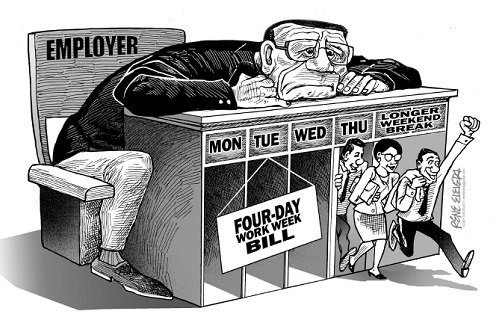While almost everyone knows that the four-day workweek bill being deliberated by Congress was born out of the need to ease traffic congestion in urban areas, the qualifier being that it is optional for employers makes it more than digestible to companies concerned that its enforcement will result in loss of productivity and revenue for them.
To be sure, longer hours or the usual workday schedule doesn’t guarantee 100 percent productivity if one were to take as example government offices whose employees report for work late and then leave an hour early.
Or there are the so-called “ghost employees” who report only on paydays on the 15th and 30th without working at all. It had yet to be determined if the four-day workweek will be valid for government offices at all, but to be blunt about it, all government offices except for truly useless ones should be open eight hours a day for six days a week to serve the public.
Not that they don’t deserve a longer weekend break, but considering the bureaucratic red tape faced by those with transactions in local or national government agencies plus the runaround they receive unless these “public servants’” hands are greased with cash, government offices should serve six days a week, probably a half day on Saturdays.
But it is the private sector that’s largely impacted by this four-day workweek, and it’s up to employers and employees to decide whether they can get by or even thrive on that schedule or be content with the six-day, eight-hour workweek.
Again, there is absolutely no guarantee that longer hours and less working days will result in either greater or lower productivity and income. It all depends on the nature of business and work done by the employer/employee.
A four-day workweek simply won’t do for construction firms rushing to complete a project, as well as laborers who may have to content themselves with lower pay for longer work breaks.
Lost in the equation for solutions to ease the traffic congestion are the millions of students who also head to class and employees who contribute to the massive ongoing traffic problem. What’s next, a shorter school season?
But there you go. In more economically prosperous nations like Australia, employers first ask job seekers how long they plan to stay and how long they are available to work in a week.
That’s not the case in the Philippines where both workers and businesses remain dependent on longer work hours for productivity and income.
Still, the government believes that longer work breaks mean better work and life balance, plus local tourism would benefit if families can spend time outside their homes which may or may not improve traffic.
The bill is still being deliberated upon, but this early, employers should dialogue with employees to determine if this work formula would be beneficial to them.
Disclaimer: The comments uploaded on this site do not necessarily represent or reflect the views of management and owner of Cebudailynews. We reserve the right to exclude comments that we deem to be inconsistent with our editorial standards.

